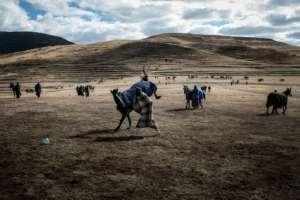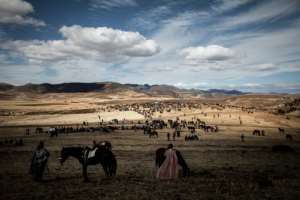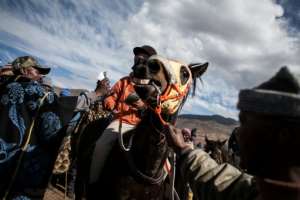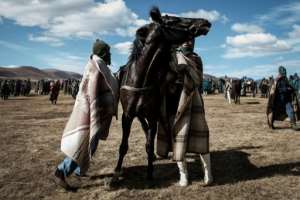 Semonkong (Lesotho) (AFP) – Across the rough grasslands of Lesotho, jockeys wearing wool balaclavas and scruffy old helmets urge their horses towards the finishing post as hundreds of spectators cheer from a nearby hillside.
Semonkong (Lesotho) (AFP) – Across the rough grasslands of Lesotho, jockeys wearing wool balaclavas and scruffy old helmets urge their horses towards the finishing post as hundreds of spectators cheer from a nearby hillside.
Horseracing in the mountain kingdom of Lesotho is not like at Ascot or Longchamp, but it is still highly competitive, involves lots of gambling and is a major social occasion.
The course at Semonkong, in the centre of the landlocked nation, hosts races once a month in the winter, with the most prestigious days marking King Letsi III’s birthday in July and independence day in October.

Before each race, the horses are paraded in front of a crowd that expertly assesses breeding, formation and fitness of runners with such exotic names as “4×4”, “Cain” and “Jerusalem”.
Then the gambling begins.
Most bets are head-to-head wagers over which of two selected horses will be faster, rather than the overall race winner.
“It’s an entertainment but it’s also our culture, and it refreshes the mind,” Mohale Mpapa, 45, a leading racehorse owner and farmer, told AFP.
“It’s important to me because I get money if my horse wins, and for the country it’s very important because we teach kids how to ride horses.

“If you take care of someone, if you respect him, you make them a good jockey. It’s the same with a horse, you need to treat it well.”
The horses are either cross-breeds, thoroughbreds from neighbouring South Africa or local “Basotho” ponies, which are better suited to the terrain and climate, and are still used for everyday transport.
The will to win
Mpapa’s current jockey is Modikeng Tladi, 16, who also works for him as a shepherd.
Tladi — wearing bright earrings — rises at dawn and looks after racehorses and sheep that all live in one small, corrugated-iron shed.
“I will be very excited if I win, and very proud, because I will have won a professional race in front of everyone,” he said before a recent race meeting.
“In my first race, I was so scared, now I’m used to it. I feel comfortable and excited when I ride the horse, I want to win all the time.”
Tladi takes the patchwork blanket off a horse called “Kodi-a-Malla” and walks him over the hills to the racecourse — a difficult job as the animal is twice his size and full of energy.

When race time finally comes, tensions mount as Mpapa checks the small saddle and issues last-minute instructions to Tladi before helping him on board.
Without stalls, the horses line up chaotically and — after several false starts — set off at a furious pace when an official waves his white flag and just avoids being trampled.
Tladi only manages fourth, but the team is happy enough.
“During training my horse got injured, so I didn’t train him very hard, and next time it will be better,” said Mpapa, who owns 15 horses in total.
Unique heritage
The Lesotho races are growing as a cultural event, and have received government sponsorship to boost visitor numbers to a nation that boasts stunning landscapes and a unique heritage independent from surrounding South Africa.
The owners of the first four horses in each race win between $20 and $70, with more than $1,000 on offer during the day.

“I have loved horses since I was very young, and they’re part of my business,” said Jonathan Hales, 46, who owns the nearby Semonkong Lodge that caters for tourists.
“The future of the horses of Lesotho comes out of these races, where all the breeders and owners can analyse and look at them.
“Tourism is also connected to the horses, so we promote them and care for them — it’s all about fun, not about winning and losing.”
Jockeys such as Tladi may not agree.
After riding in several races and making some small bets, he made about $60 during the day — 10 days of normal pay.
While the owners of victorious horses celebrate with joyful dancing, the jockeys barely manage a smile as they quickly ride over to collect their cash.
For the spectators, many of them wearing traditional blankets, racing combines their passion for animals with a chance to test their luck and judgement.
“The horse I bet on just lost, but I will keep gambling, I just love horses,” said 50-year-old Motseki Pakela




